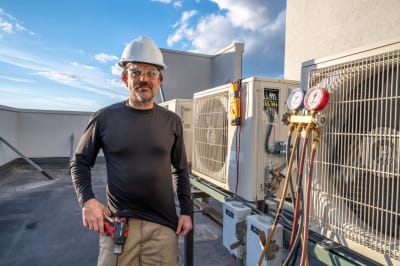HVAC technicians play a compelling role in our daily existence. Most of us cannot do without functional heating and cooling systems, none of which will be possible without HVAC technicians to install, maintain, fix, and upgrade.
Thanks to the importance of their jobs, HVAC technicians are in great demand everywhere, including in Michigan. But because of the particular skills that they need to have to succeed on the job, it is also essential for an aspiring HVAC technician to acquire training and fulfill some educational requirements before they can get started.
To help future technicians in Michigan get familiar with these requirements, we have provided a comprehensive guide below containing every key aspect of the process.
How to Become an HVAC Technician in Michigan
Apart from meeting the essential requirement of being at least 18 years old and having a high school diploma or GED, the most crucial step in becoming an HVAC technician in Michigan is to acquire appropriate training.
In this regard, there are a few options, including the following:
Degree and Certificate Programs
Even though HVAC technicians in Michigan are not mandated by law to have advanced degrees from colleges and technical schools, many choose this route simply because it offers more appeal when securing employment.
It also sometimes leads to a higher starting salary and a solid theoretical knowledge of basic principles.
Those who wish to graduate faster and kick-start their career as soon as possible may choose the certificate option. In contrast, those who don’t mind spending more time in school may go for associate degree or even bachelor’s degree programs.
Apprenticeships
Because, as mentioned earlier, HVAC technicians in Michigan don’t need advanced education to start their careers, many people simply enroll in an apprenticeship program and obtain all the training they need this way.
From the start, apprenticeship training programs are often organized by unions and approved companies looking to build up new technicians in their ethos.
Students are also trained to operate hand and power tools, make necessary repairs, and become familiar with essential materials.
Most apprenticeship programs last between 3 to 4 years.
Consider Trades with Similar Paths:
Top HVAC Technician Schools in Michigan
Below are some of the most prominent HVAC technician schools in Michigan:
Northwest Technological Institute
Southfield, MI Online + Campus
Northwest Technological Institute is known for offering a fast-track route to becoming an HVAC technician in Illinois. The program lasts 10 and 1/2 months but keeps instructional quality intact.
Tuition
$5,000 - $15,000Contact
(248) 358-4006
ug-admission@northwestern.edu
Wayne County Community College
Detroit, MI Online + Campus
Wayne County Community College boasts numerous high-quality technical and medical programs. The school's HVAC technology department offers an associate degree and a certificate program.
Tuition
$3,263 - $3,998 per YearContact
(313) 496-2600
studentservices@mail.wcccd.edu
Henry Ford College
Dearborn, MI Online + Campus
Henry Ford College is another incredible option for aspiring HVAC technicians in Michigan to consider. While there used to be an associate degree option in the past, nowadays, the school offers only a certificate option, which is still enough to secure employment or seek more advanced degrees.
Tuition
$2,664 - $6,744 per SemesterContact
(313) 845-9600
enrollmentservices@hfcc.edu
Explore HVAC Technician Schools by City:
Licensure and Certification Requirements
There are three major types of licenses for HVAC technicians in Michigan. These include the apprenticeship license, contractor license, and specialty license.
The apprenticeship license is for students in training, while the contractor license is for those who have completed training and have met the necessary work experience requirements.
Specialty licenses are for those looking to specialize in a handful of areas, including solar and fuel gas piping.
To apply for these licenses, applicants must be at least 18 years old, have their high school diploma, and have college/ vocational school training or apprenticeship training in its place.
From there, they may apply for the licensing exam, which they must pass with a minimum score of 70%.
Salary and Job Outlook
The annual average salary for HVAC technicians in Michigan is $51,747 - in line with the national average. Entry-level technicians earn around $34,790, while those in the top 10% take home an average annual salary of $76,970.
Sorting strictly by location, the highest paying cities in Michigan for HVAC technicians are Farmington Hills, with a yearly average salary of $83,938; Kalamazoo, with a yearly salary of $58,693; Auburn Hills, with an average annual wage of $57,834; Portage with $57,034; and Detroit with an average annual wage of $55,823.





